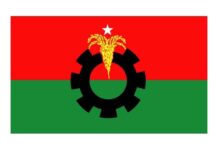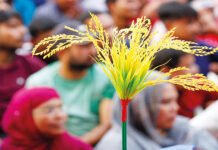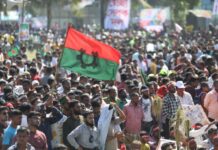Information Minister Hasanul Haq Inu says the Awami league’s student affiliate and the allegations of corruption over the Padma bridge project have affected the image of the government during the last four years.
“The unruly acts of [Bangladesh] Chhatra League in educational institutions have undoubtedly undermined democracy,” he said on Tuesday.
“And we are embarrassed with the corruption allegations in the Padma bridge project,” the minister added.
He was speaking at a press conference called to uphold the government’s successes over the last four years and compare them with the development works of the past BNP-led government.
Inu, chief of the Jatiya Samajtantrik Dal (JSD), said the government had taken steps after graft allegations were raised in the Padma bridge project.
The World Bank had pledged a $1.2 billion credit in the $2.9 billion project but later pulled itself out raising graft allegations. It eventually returned as the government managed to strike a deal with it.
The Anti-Corruption Commission had been probing the allegations. After nearly six months of investigation, the national anti-graft agency sued some high ranking government officials for their suspected involvement in a ‘conspiracy to exchange bribes’ to appoint Canadian firm SNC Lavalin as the project’s consultant.
The list of accused, however excluded former Communications Minister Syed Abul Hossain and former Foreign Ministry State Minister Abul Hasan.
The World Bank external panel, formed to oversee the ACC probe, had visited Dhaka twice but apparently left dissatisfied.
“Ministers and secretaries have been removed from their posts [during the suspected graft probe]. We are taking steps on various phases for the investigation to progress,” the Minister said.
Inu said any incident of corruption within an administration generally embarrasses authorities. “Likewise, any unruly act also embarrasses [the country’s] politics,” he said.
The Information Minister said the government was trying to confront those problems instead of avoiding them.
Jamaat, Shibir attacks on police
When his attention was drawn to Monday’s concerted attack of Jamaat-e-Islami and its affiliate, Islami Chhatra Shibir, on police, he said it is difficult to thwart a sudden attack.
He said an investigation will be started to find out how the sudden attacks had taken place despite prior intelligence.
Inu said the attacks were being analysed. “We’ll soon know whether it (the attacks) was a failure of the administration or intelligence. If there were failure on part of police, it will also be probed,” he added.
He said the law enforcers were trying to face the situation with patience.
Jamaat, Shibir activists attacked the police across Bangladesh demanding release of their top leaders currently standing trials at the two International Crimes Tribunals on war crimes charges.
The Minister came down hard on Jamaat and its student affiliate Islami Chatra Shibir for the attacks. “The abrupt attacks prove that they are not only sympathisers of the suspected war criminals but also are involved in a plot to destroy Bangladesh’s democracy,” he alleged.
Sagar, Runi and Biswajit
The Information Minister said the law enforcers had brought the perpetrators to book swiftly except in the case of Sagar-Runi’s murder.
Maasranga TV News Editor Sagar Sarowar and ATN Bangla Senior Reporter Meherun Runi were found murdered in their West Rajabazar flat on Feb 11. The law enforcers have so far failed to nab the killers.
He admitted that the puzzle of BNP leader M Ilias Ali’s disappearance has not been solved yet.
Inu said the killing of Biswajit Das at the hands of alleged pro-government students during the opposition-sponsored countrywide Dec 9 road blockade in Old Dhaka was ‘unfortunate’.
He promptly said the real ‘murderers’ have been nabbed with the media’s assistance and said the government was not sparing anyone.
“It’s a positive sign. During our tenure, we are trying to bring everyone to book under law. That contrasts to the BNP’s culture of forgiving and shielding criminals. We are journeying towards democracy from military autocracy.”
War crimes trials
The Minister said it is the duty of the court to hold trials. “It is the government’s duty to execute the verdicts.”
“The court will finish trying the suspected war criminals without any external influence. It (the trials) has nothing to do with the government’s tenure.”
The government set up the first tribunal in 2010 to hold war crimes trials, one of Awami League’s election pledges. Two years later, a second tribunal was formed to expedite the trials. The Jamaat has been opposing the trials.
The Islamist party and its student front, Shibir, had been on the streets since November last year demanding its leaders’ release.
On Jan 23, the second tribunal delivered the first verdict in war crimes cases. It sentenced to death former Jamaat activist Abul Kalam Azad aka Bachchu Razakar tried in absentia.
Several cases are in their final leg. The first war crimes tribunal of Bangladesh on Tuesday finished hearing the prosecution’s argument on Delwar Hossain Sayadee. A verdict is expected to come soon.
The case of Jamaat Assistant Secretary General Abdul Quader Mollah also awaits a judgement.
Source: bdnews24









